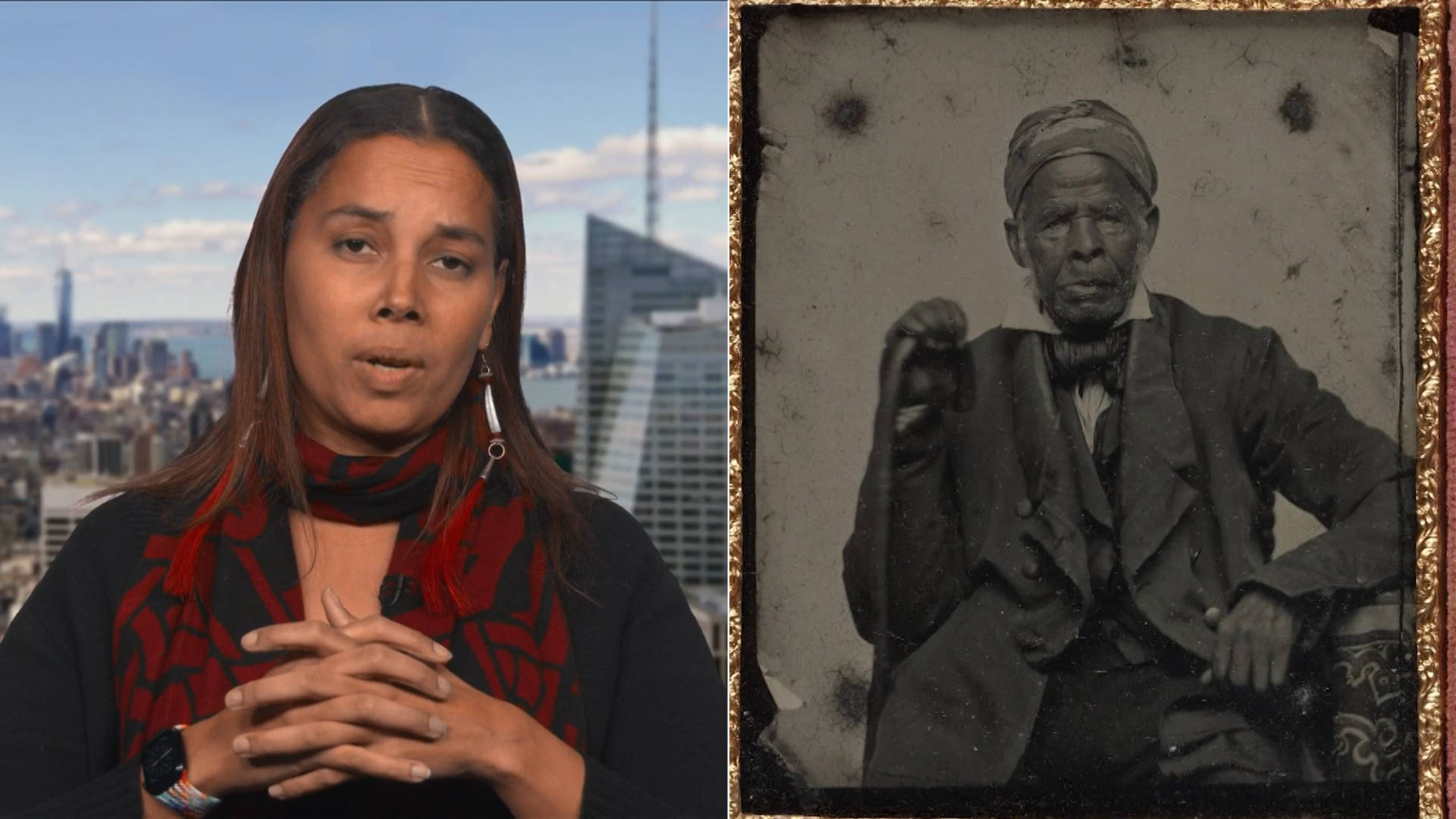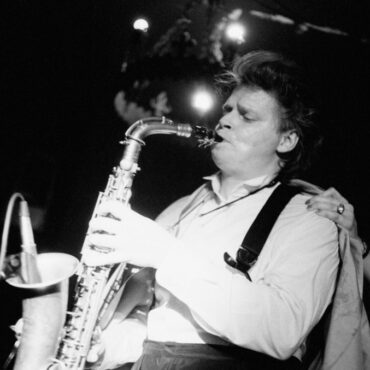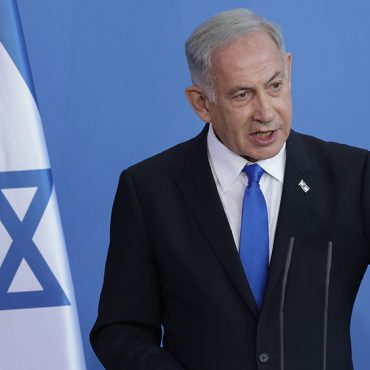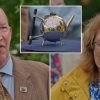This is a rush transcript. Copy may not be in its final form.
AMY GOODMAN: “At the Purchaser’s Option” by our next guest, Rhiannon Giddens. This is Democracy Now!, democracynow.org, The War and Peace Report. I’m Amy Goodman.
As we continue our Juneteenth special, we turn now to the pioneering musical artist Rhiannon Giddens. She first gained fame as a member of the Grammy Award-winning Carolina Chocolate Drops, a Black string band which inspired a new generation of Black musicians to play the banjo and fiddle. Giddens has gone on to have a celebrated solo career and has even collaborated with Beyoncé. Giddens’s banjo playing can be heard on “Texas Hold ’Em,” a hit single by Beyoncé, who became the first Black woman to ever top the Billboard’s Hot Country Songs chart.
In 2023, Rhiannon Giddens won a Pulitzer Prize for her opera Omar, about Omar ibn Said, a Muslim scholar in Africa sold into slavery and forcefully brought to Charleston, South Carolina, in 1807. In a moment, we’ll hear Rhiannon Giddens talk about Omar. But first, an excerpt from the song “Julie’s Aria” from the opera Omar.
RHIANNON GIDDENS: [singing] My daddy wore a cap like yours
He got down on his knees and he faced the rising sun
And he did it again when the day was done
He wouldn’t need this and he wouldn’t need that
No matter the lee, no matter the fed
He drove my mama crazy, but she loved him anyway
They found each other in the darkness
The way they looked at the world wasn’t the same
But the way that they looked at each other, there was the flame
They sold my daddy down when I was ten
I’ve never grown as fast as I did then
AMY GOODMAN: That’s “Julie’s Aria” from Rhiannon Giddens’s Pulitzer Prize-winning opera Omar, which she wrote with Michael Abels. I spoke to her in October 2023 on the day she received the Pulitzer Prize.
AMY GOODMAN: Rhiannon, this is just astounding. Can you talk about the life of Omar ibn Said?
RHIANNON GIDDENS: I can, yeah. He was a 37-year-old Qur’anic scholar, who had been studying, you know, for all of his adult life, and even when he was a child. And he was 37 years old, and he was sold into slavery. His compound was overrun, and he was sold, and he had to go over the Middle Passage, and he ended up in Charleston, was his first port of call. And he was sold to a man there, that he, I think, used him pretty badly, like put him in the fields and treated him very badly. And, you know, he ran away from him, and he ended up in North Carolina. And they found him in a jail. They put him in jail, because you couldn’t just be a random Black person walking around. Somebody had to own you, or you were, you know, imprisoned. And so he was put into jail. And he was found there, and he had written on the walls, with the ashes, verses of the Qur’an. And so, he was sold to a family in North Carolina, where he lived out the rest of his life, another 50 years. He lived into his eighties and was never freed.
And the reason we know who he is is that he wrote an autobiography in Arabic. So, he was pressed upon to write the story of his life, even though he begins it with “I cannot write my life,” because this was 20 years after he had been brought to the United States. And it’s just a remarkable document. It’s the only — as best as the scholars who’ve told me know, it’s the only autobiography written by an enslaved person while they’re enslaved, that we have, you know, anywhere in the United States. And it’s definitely the only document written in Arabic by an enslaved person. So, it’s a really special thing that we have it.
And I was commissioned by the Spoleto Festivals, the first opera they commissioned, to write an opera, and I brought in Michael Abels, who’s an incredible composer and film scorer, and who knows the orchestra and knows how to write for orchestra. I know how to write for banjo and for voice. So, between the two of us, we created the score for Omar, and I wrote the libretto. And it was a really intense experience, you know.
But it’s just so amazing that Omar’s story has been — is being lifted by this opera, being lifted by the existence of this work, and more and more people are knowing about him, because the whole point for me was to complicate the — again, the complication — to complicate the American narrative, like who gets to say that they represent the American story, you know? Why is — why is the Mayflower‘s — you know, somebody who came on the Mayflower, why is that held up as representational, when Omar’s is just as representational? It’s just not as — you know, it’s not as pleasant. It’s very challenging, and also that there were so many Muslims that were brought over to the United States, and they have, you know, a massive impact on the culture and, in some places, the language. You know, if you go to the Georgia Sea Islands, where you can trace some of the words in Guale to Arabic.
So, it’s just — it’s just an opportunity to really just kind of blow things wide open and go, “Well, this is another huge part of the story that hasn’t been told.” And going through the life of Omar, you can really represent that in a way that’s just really remarkable, because he was remarkable. You know, he was remarkable, that he was able to hold onto his faith. He quoted the Qur’an ’til he died, you know, and he was by himself. He wasn’t like, you know, surrounded by people that — you know, like he was when he was back home, and he has to carry the whole thing on his own. You know, he has to remember the verses. He has to remember the language. He has to do it all, you know, in isolation. And that’s just — you know, it’s a thing. And he did it. And now that — he left something so that we can, you know, look at his words and go, “Wow, what a remarkable life.”
AMY GOODMAN: Rhiannon, you talk about Omar living out his years in North Carolina. You were born in North Carolina, in Greensboro. Can you —
RHIANNON GIDDENS: Yes.
AMY GOODMAN: — talk about your own Indigenous and African American roots and how you first picked up the banjo, how you got involved with music, the trajectory of your life and all of the musical forms that you have now excelled in and express yourself in?
RHIANNON GIDDENS: Wow! OK. How much — how long do you have? OK, I’ll give you the capsule version. Yeah, I’m from North Carolina, from a mixed family, mixed Black and white and, I know, Indigenous, you know, back there. It’s kind of a typical Southern story of Black, white and red mixed in sort of indiscriminate ways. And I don’t claim a tribal affiliation. I like to say I’m like Native adjacent, you know? I know I’ve got cousins who identify as Native, but I, myself, use that story to try to raise awareness and to highlight and to ally myself with the Native story, the Indigenous story, because so many Indigenous people feel invisible, because, you know, a lot of mainstream culture just assumes that that was passed and there’s not even — “There’s no Indians around.” And I use the word “Indian,” because a lot of people, especially in North Carolina, consider themselves as Indian, Indian Country, Indian culture. So, you know, it’s complicated, not any group is monolithic, including Indigenous people. And then, you know, obviously, there’s Black and white, and that’s been the main — my main sort of affiliation. And I didn’t know anything about Omar’s story, which made me so mad, because I was born and raised in North Carolina. But anyway, you know, that’s another thing.
So, I just grew up, you know, as a Southerner, and I grew up with my grandparents first and living out in the country and listening to Hee Haw and listening to blues and jazz records and just whatever they were listening to. And, you know, over the years, I’ve got a lot of different music from different people — my dad, my sister, my mom, my grandparents — and just sort of took it all in, and went to Oberlin, you know, graduated with a bachelor’s in music. You know, I always loved opera. I loved it. I love it. I still love it. You know, I was soprano. I did a bunch of operas. I was Juliet. I was all of these things. And then I came back home, and I was like, “What am I doing? You know, like, what am I doing in opera that like a million other sopranos can’t do as good or better than me? Like, what am I bringing?” I remember thinking this, you know?
And while I was trying to figure that out, I started contra dancing. Like, it’s like square dancing, but in long lines. It’s a community dance, you know? And that’s when I fell in love with the banjo, because there were always live bands and a lot of old-time bands. And then I found out the history of the banjo, and then I was — kind of record scratch time. You know, that was it. It wasn’t just because I love the banjo, but I felt the injustice of having been raised in North Carolina surrounded by banjo music, not knowing the true history of the banjo, like wanting to learn the banjo and feeling like I had to ask permission, you know, and then finding out that the banjo itself is a Black instrument and that the tradition itself is a Creole tradition that’s a cross-cultural collaborative tradition, and that I didn’t have to ask any permission to play this music, because it was my music, you know. And I just got really upset. You know, I just got mad. I was just like, “Why haven’t I been told this? You know, why don’t I know this?” And then, immediately falling on the heels of that question was: And in whose best interest is it that I don’t know this thing?
And so, that just kind of set me off on my path of, you know, trying to uncover, to discover, to shine a light, you know, and just I’ve just kind of gone where I’ve been led, really, because I just — I love — I loved all the stories, the stories that we don’t hear, you know, in our school system, the stories that aren’t deemed interesting enough or that deviate from the narrative of this is white and this is Black, and Brown doesn’t exist, and, you know, let’s keep everything separated so that they don’t realize that we’re snookering them all.
AMY GOODMAN: So, talk about being a part of The Carolina Chocolate Drops. And then I want to ask you about Our Native Daughters, Rhiannon.
RHIANNON GIDDENS: Of course, yeah. The Carolina Chocolate Drops is a, you know, Black string band that was formed around 2006. And kind of the center of it was learning from Joe Thompson, who was an 86-year-old African American fiddler from Mebane, North Carolina, that was one of the last, like, proponents of the old string band tradition, not the only Black fiddler, you know, left in the country, but one of the last of that kind of old-time, you know, Black string band tradition, rural tradition, where it had been passed down as an oral tradition from the time of slavery. And so, you know, we wanted to take that out into the world and educate about that.
So, it was myself, Dom Flemons and Justin Robinson, were the original members of the Chocolate Drops. Over the years, there would be different, really super talented Black instrumentalists and singers who have come into the group and gone on to do great things, like Leyla McCalla, Hubby Jenkins. The first trio was myself, Dom and Justin, and we were the ones who worked with Joe Thompson for some years.
AMY GOODMAN: And then, Our Native Daughters, and Songs of Our Native Daughters, which highlight the struggle, the resistance, the hope of Black women, resonating back to the 17th, the 18th, the 19th century, talk about your work there.
RHIANNON GIDDENS: Yeah, I was in the Smithsonian, the Museum for African American Culture — History and Culture at Smithsonian in D.C. And I was just really struck with some of the historical exhibits. And I was just thinking that — how we need to be making music from these really hard things. And it started just kind of turned into this project. I, you know, was — they asked me to record something for them. And I said — I’m just thinking, “OK, here’s the project. I want to do something with these historical things in the Smithsonian.”
And then it just kind of like, as I was thinking about who to do it with, you know, women, the story of women, especially Black women, really is what has driven me a lot in my solo work. You know, my earliest songwriting dealt with women during the slavery times and coming from slave narratives, enslaved people’s narratives and different paraphernalia around slavery, but always centering women, because I felt like that’s not the stories we get. You know, even if we get enslaved stories, we don’t always get — other than Harriet Tubman. That’s kind of it. And so, the opportunity to bring three other Black women, you know, together with myself.
And then I wanted the banjo to be central, because it’s also been so maligned and so misunderstood. And it’s so central to American culture, you know, that I wanted it to be other banjo-playing Black women. So, I keep telling people, like, “There’s more than just me. There’s a lot of us, actually, at this point, you know.”
AMY GOODMAN: Rhiannon, can you tell us your favorite song from Our Native Daughters?
RHIANNON GIDDENS: Oh gosh, you know, I love them all. But, like, I think “Moon Meets Sun” was one of the first ones that we wrote, and it was one that three of us wrote together. Leyla wasn’t there that day. It was me and Alli and Amythyst. And it really has all three of us in it. And that’s just — that was just a magic moment. We just kind of went, “OK, this is a thing. Like, this is so cool.” We don’t have to explain ourselves to each other. We don’t have to, like — you know, we just, like — there was just so much that we didn’t have to do, because we all were like, “Yeah, yeah, yeah. We know — yeah, yeah, yeah, yeah, yeah.” You know? And it was just — it kind of made for a really wonderful communal energy that surrounded the song. So that’s definitely one of my favorites.
OUR NATIVE DAUGHTERS: [singing] When the day is done
The moon meets the sun
We’ll be dancing
When the day is done
The moon meets the sun
We’ll be dancing
You put the shackles on our feet
But we’re dancing
AMY GOODMAN: The pioneering musical artist Rhiannon Giddens. We spoke in October 2023, the day she received the Pulitzer Prize for her opera Omar. When we come back, we’ll talk about her song “Another Wasted Life” and how she worked on the song’s video with 22 people who were wrongly incarcerated.
[break]
AMY GOODMAN: “Texas Hold ’Em,” by Beyoncé, featuring the banjo playing of our guest, Rhiannon Giddens.











Post comments (0)